Careful moving to the Netherlands with his wife and mortgage. Part 1: Job Search
On Habré and indeed on the Russian-speaking Internet there are many instructions on how to move to the Netherlands. I myself learned a lot of useful things from one article on Habré ( now, apparently, there is no longer hidden in the draft , here it is ). But I will nevertheless tell about my experience in finding a job and moving to this European country. I remember when I was just about to send out a resume, and when I was already interviewing, I was very interested to read about the similar experience of other colleagues in the shop.
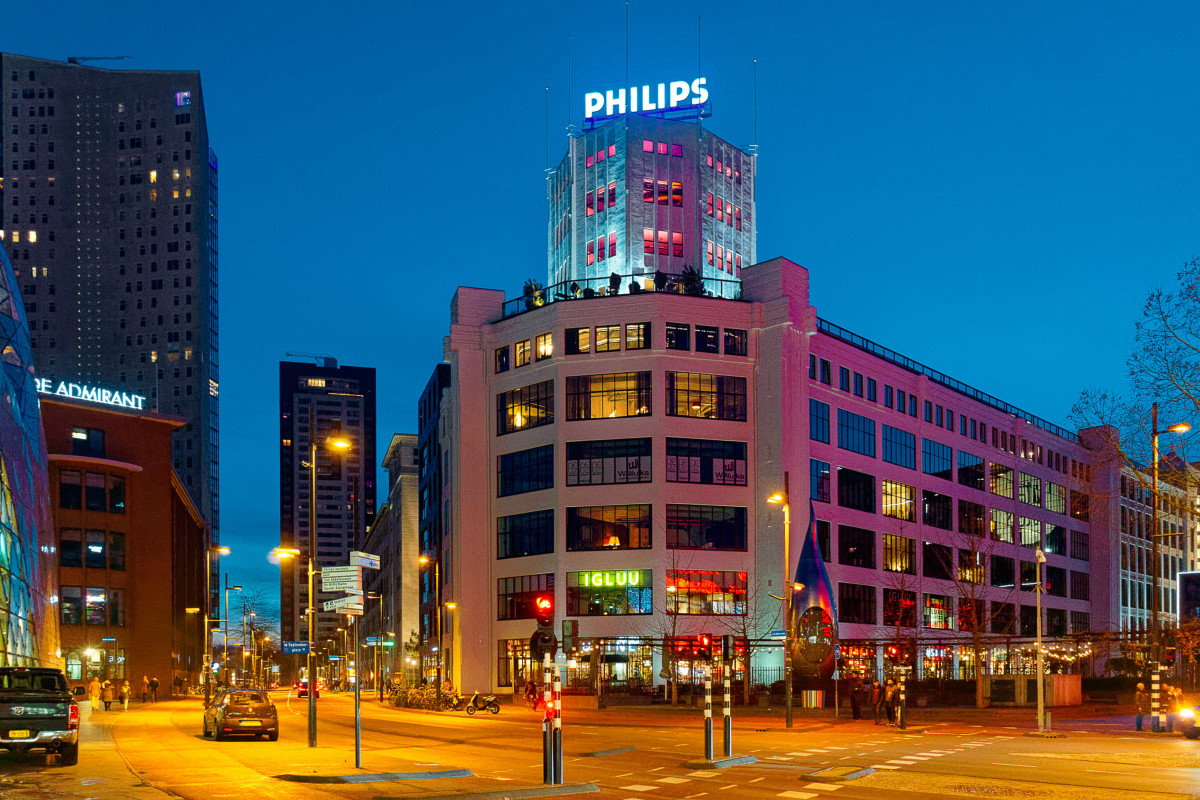
In general, if you are interested in a story about how a C ++ programmer from the Moscow Region looked for work in Europe, preferably in the UK, but found in the Netherlands, moved there himself and brought his wife, all this with an outstanding mortgage in Russia and with little adventure - welcome under cat.
A short review of my career, so that it is approximately clear what I was trying to sell to potential foreign employers.
In 2005, I graduated from university in my native Saratov and went to graduate school in Dubna near Moscow. In parallel with his studies, he worked part time, wrote something in C ++ (even ashamed to remember). For three years he managed to give up on a scientific career and in 2008 he moved to Moscow. I was lucky with the first normal work (C ++, Windows, Linux, a well-established development process), but in 2011 I found a new one. Also C ++, only Linux and a more interesting technology stack.
In 2013, I finally defended my candidate and for the first time decided to somehow move in the direction of abroad. Samsung held a certain fair in Moscow, I sent them a resume. In response, they even interviewed me on the phone. In English! The Koreans made the impression of complete gouging - they did not have either my resume or the presentation sent to them in advance. But they giggled, naturally giggled. This offended me greatly, and I was not upset when they refused me. A little later I found out that such a laugh among Koreans is an expression of nervousness. Now I prefer to think that that Korean was also nervous.

Then I rejected the idea of abroad, changed my job. C ++, Linux, Windows, even a little bit for the microcontroller peed in C. In 2014, he took a mortgage, moved to the nearest Moscow region. In 2015, I was fired (many were then fired), I found a job in a hurry. I realized that I was mistaken, I was looking again, and in the same 2015 I got to one of the best places in Moscow, and indeed Russia. The best job in my career, a bunch of new technologies for me, annual salary increases and an excellent team.
There would calm down, right? But it didn’t work out. There is no single reason that made me decide to move (for now, I am avoiding the word "emigration"). There is a bit of everything: the desire to test myself (can I communicate in English all the time?), And the boredom of a quiet life (to get out of my comfort zone), and the uncertainty about the Russian future (economic and social). One way or another, since 2017, in addition to wanting, I began to take active steps.
I began by deciding to find out in detail about the vacancy, which has already been years 4, if not all 6, pissed off my eyes - "I need a C ++ programmer for a Russian-Vietnamese company in Hanoi." I overcame my introversion and talked in social networks with strangers to me - Russian employees of that company. It quickly became clear that such conversations were very useful, and there was nothing to do in Vietnam. OK, looking further.
Of the foreign languages, I have only English. I read, of course. I also try to watch movies and TV shows in the original (with subtitles, without them it’s uncomfortable). Therefore, for a start, I decided to limit myself to the English-speaking countries of Europe. Because I’m not ready to leave further than Europe, either then or now (and my parents are not getting younger, and sometimes you need to look after the apartment). There are exactly 3 English-speaking countries in Europe - Great Britain, Ireland and Malta. What to choose? Of course London!
I updated / got myself profiles on LinkedIn, Glassdoor, Monster and StackOverflow, re-compiled a resume, translated it into English. He began to look for vacancies, stumbled upon Bloomberg. I remembered that a year or two earlier someone had sent me a booklet from Bloomberg, and everything was so beautifully painted there, including help with the move, that I decided I would try to get there.
I had not had time to send anything anywhere, as in May 2017 a recruiter from London contacted me. Offered a vacancy in some kind of near-financial startup, offered to talk on the phone. On the appointed day and hour, he called me on a Russian number and, word for word, said that now let's try in Bloomberg, there are pluses there. And about a financial startup? Well, there they no longer need, or something like that. Well, I actually need something in Bloomberg.
The very fact that I was able to talk with a real Englishman (yes, it was a real Englishman), and I understood him, and he understood me, inspired me. I registered where necessary, sent a resume to a specific vacancy, indicating that I had found me and brought this recruiter by the handle. I was scheduled for the first video interview in a couple of weeks. The recruiter provided me with the materials for the preparation; I completed the reviews on Glassdoor myself.
I was interviewed by an Indian, about an hour. The questions were in many respects similar (or even just coincided) to those that I had already studied. There was a theory, and the actual writing of the code. What pleased me most at the end was that I was able to conduct a dialogue, I understood the Hindu. The second video session was scheduled to spend a week and a half. This time there were two interviewers, one of them is clearly Russian-speaking. Not only did I solve the problems for them, but I also asked the questions I had prepared and asked about the projects. After an hour of conversation, they told me that now I will have a break of 5 minutes, and then the next couple of people will come. I did not expect this, but, of course, did not mind. And again: they are tasks for me, I am questions for them. Total two hours of interview.
But then I was invited to a final (as the recruiter explained to me) interview in London! They gave me an invitation letter with which I went to the visa center and applied for a UK visa for my money. Tickets and hotel paid by the inviting party. In mid-July, I went to London.
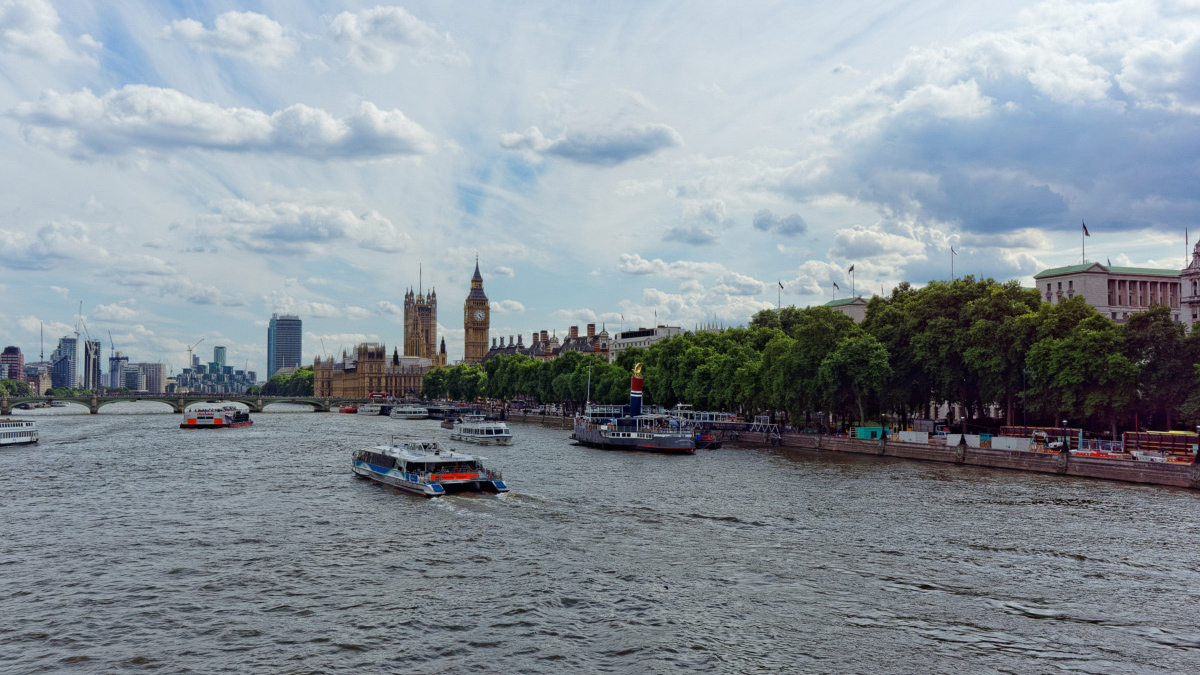
The recruiter met me about 20 minutes before the interview, gave me the latest instructions and tips. I expected that they would interrogate me for 6 hours (this was written on Glassdoor), but there was only an hour-long conversation with two techies. I solved only one problem for them, the rest of the time I was asked about my experience, and I asked about their project. Then half an hour with HR, she was already interested in motivation, and I had some answers prepared. In parting, they told me that because If there is no manager now, he will contact me later - in a week or two. The rest of the day I wandered around London for my pleasure.
I was sure that I did not screw it up, and in general everything went well. Therefore, upon returning to Moscow, I immediately signed up for the next IELTS exam (needed for a British work visa). Two weeks trained to writeessaysessay and passed by 7.5 points. This would not be enough for a student visa, but for me - without language practice, after only two weeks of preparation - it was just great. However, a London recruiter soon called and said that Bloomberg was not taking me. "Did not see enough motivation." Well OK, looking further.
Even when I was just going to London, Amazon recruiters wrote to me and offered to participate in their hiring event in Oslo. That's how they recruit people to work in Vancouver, but this time they are interviewing in Oslo. I don’t need to go to Canada, Amazon, judging by the reviews, is not the most pleasant place, but I agreed. I decided to gain experience if there was an opportunity.
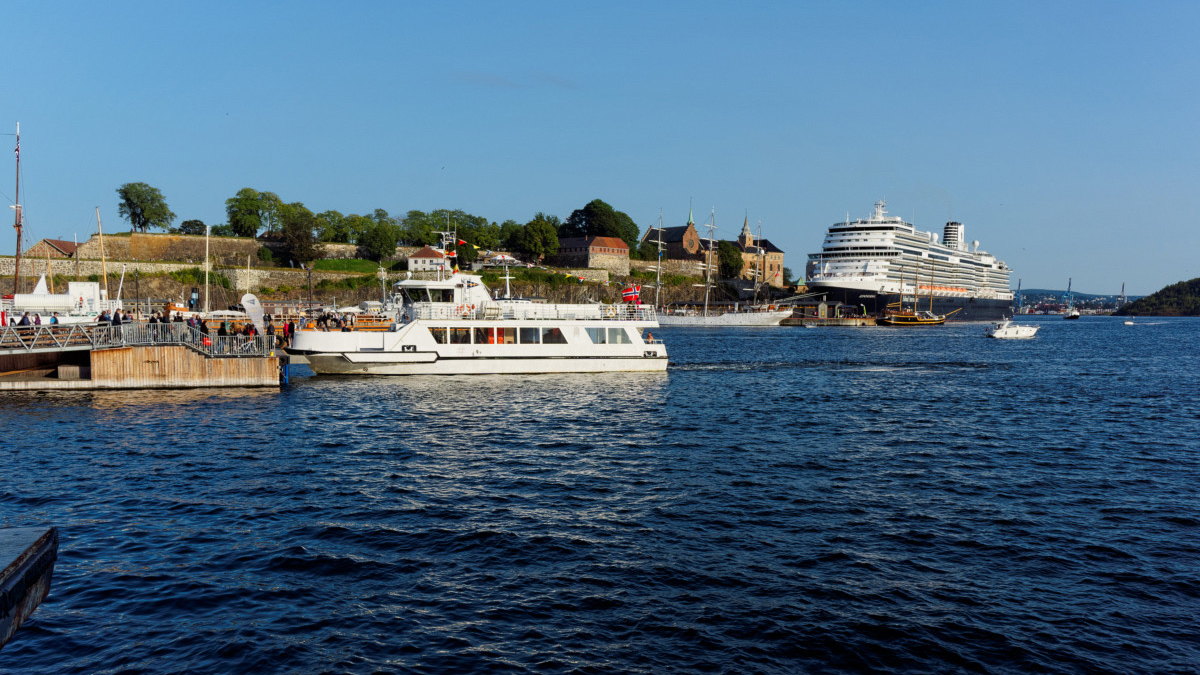
At first, an online test is two simple tasks. Then the invitation itself to Oslo. A Norwegian visa is several times cheaper than a British visa and is 2 times faster. This time I paid for everything myself, Amazon promised to reimburse everything after the fact. Oslo was surprised by the high cost, the abundance of electric vehicles and the general impression of a large village. The interview itself consisted of 4 stages of 1 hour. At each stage - one or a couple of interviewees, a conversation about my experience, a task from them, questions from me. I did not shine and a few days later I received a natural refusal.
From my trip to Norway, I made a couple of new conclusions:
I registered on a couple of British sites with technical vacancies. Ah, what salaries were indicated there! But no one answered my responses on these sites, and no one looked at my resume. But somehow British recruiters found me, talked to me, showed me some vacancies and even sent my resume to employers. In the process, they convinced me that 60 thousand pounds a year is a lot, no one will take me with such Wishlist. It also turned out that according to the resume, I am a job hopper, because changed 4 jobs in 6 years, but you need to spend at least 2 years on each.
I did not regret 50 pounds and sent my resume for revision to professionals. The professional gave me some result, I made a couple of comments, he fixed it. For another 25 pounds I was offered to write a cover letter, but I, not impressed by their previous result, refused. I used the resume itself in the future, but its effectiveness has not changed. So I am inclined to consider such services as a divorce of gullible and insecure applicants.
By the way, British and Irish recruiters have a bad habit of calling without warning. The bell can overtake anywhere - in the subway, at lunch in a noisy dining room, in the toilet, after all. Only if they drop their call, they write a letter with the question "When will it be convenient to talk?"
Yes, I started sending resumes to Ireland. The reaction was very weak - 2 unsuccessful calls and a polite letter with a refusal in response to a dozen and a half or two resumes sent. I got the impression that there are 8-10 recruitment agencies in all of Ireland, and in each I have written at least once.
Then I decided that it was time to expand the geography of searches. Where else do you speak English well? In Sweden and the Netherlands. I have not been to the Netherlands before, but I had to in Sweden. The country did not cause enthusiasm, but you can try. Here are just vacancies in Sweden in my profile was even less than in Ireland. As a result, I received one video interview with HR from Spotify, which I did not go beyond, and a short correspondence with Flightradar24. These guys quietly merged when it turned out that I was not going to work for them remotely with the prospect of someday relocating to Stockholm.
It's time to get to the Netherlands. To begin with, my wife and I went to Amsterdam for a few days to see how it is. The entire historical center is densely smoked with grass, but on the whole we decided that the country is decent and you can live. So I began to look at vacancies in the Netherlands, not forgetting, however, about London.
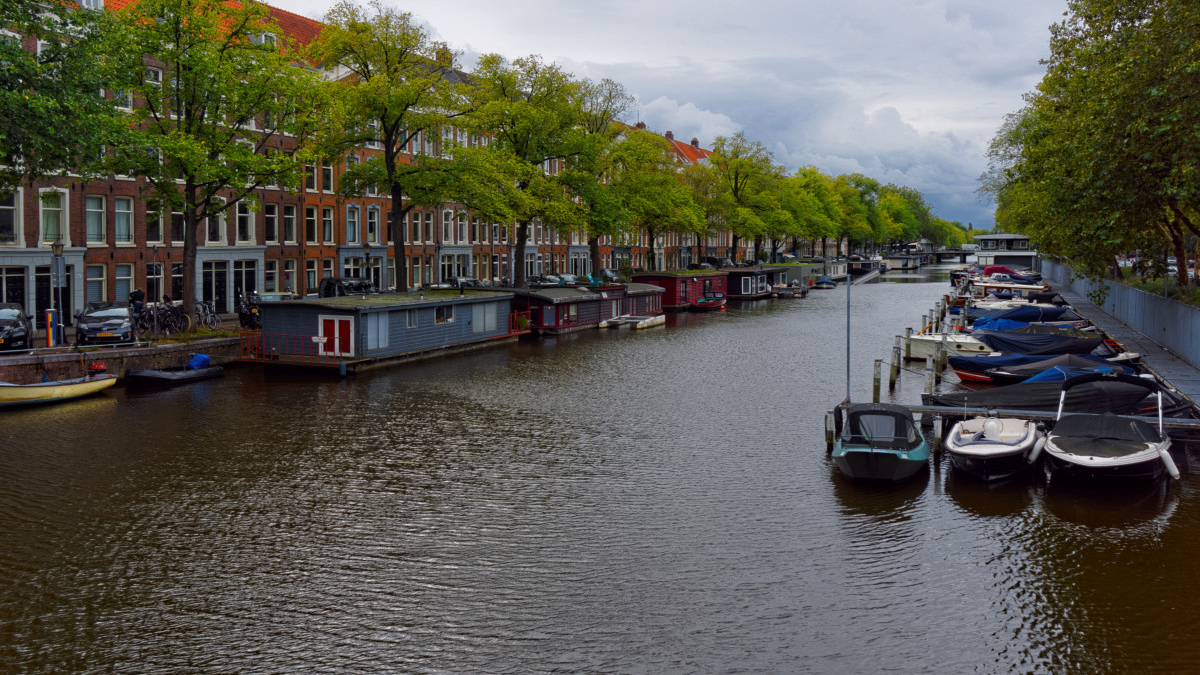
Jobs, compared with Moscow or London, were not many, but more than in Sweden. Somewhere they refused me right away, somewhere after the first online test, somewhere after the first interview with HR (Booking.com, for example, it was one of the strangest interviews, I still don’t understand what they specifically wanted from me and in general), somewhere - after two video interviews, and in one place after the completed test task.
The interview structure of the Dutch offices is different from that in Bloomberg or Amazon. Usually it all starts with an online test, where you need to solve several (from 2 to 5) technical problems in a couple of hours. Then the first introductory interview (by phone or skype) with technical specialists, a conversation about experience, projects, questions like “What would you do in such and such a case?”. What follows is either a second video interview with someone of a higher rank (architect, team leader or manager) or the same thing, but already in the office, face to face.
It was these stages that I went through with the companies, from which I eventually received an offer. In December 2017, I solved 3 problems on codility.com. And by that time I almost remembered solving such problems by heart, so they did not cause problems. This is to say that the technical part is almost the same everywhere (except for Facebook, Google and perhaps Bloomberg - see below). A week later, a telephone interview took place, it lasted an hour instead of the promised 15 minutes. And all this hour I stood in some corner of my open space, trying not to look suspicious (yeah, speaking English). A week later, I had to knock out at least some answer from HR, which turned out to be positive, and I was invited to an on-site interview in Eindhoven (I paid for the flight and accommodation).
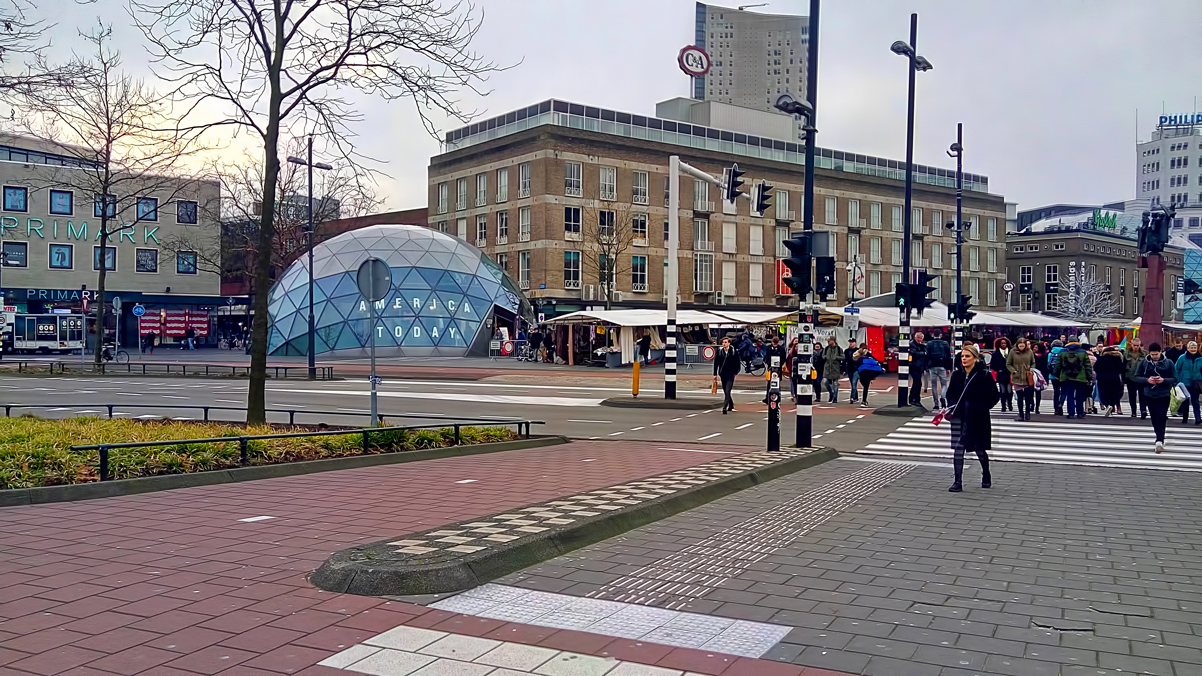
I arrived in Eindhoven the day before the interview and managed to walk around the city. It struck me with cleanliness and warm weather: in January it was about like in a warm October in Moscow and Moscow region. The interview itself consisted of three hourly stages, 2 interviewers each. Topics for discussion - experience, interests, motivation, answers to my questions. The purely technical part ended on an online test. One of the interviewees, apparently, decided to try out a fashionable technique - a joint dinner. My advice is, if there is an opportunity to avoid this, use it, and if you yourself will interview, do not do this, please. Noise, din, ringing devices, in the end I could barely hear a man a meter away. But in general, I liked the office and people.
After a couple of weeks, I again had to kick HR to get a feedback. He was positive again, and only now we began to discuss the actual money. They asked me how much I want, and offered a fixed salary and an annual bonus, depending on personally my successes, the successes of my unit and the company as a whole. In total, it turned out slightly less than I requested. Remembering all sorts of articles on how to get a big salary, I decided to bargain, despite the fact that the articles described mostly American realities. I knocked out a couple more thousand gross and at the end of January 2018, not without hesitation (see below) accepted the offer.
Somewhere in October 2017, I still got some positive reaction from London. It was an American company Yelp, recruiting engineers in its London office. First of all, they sent me a link to a short (15 minutes, not 2 hours!) Test at www.hackerrank.com. After the test, followed by a difference of a week and a half, 3 interviews on Skype. And although I didn’t go further, these were some of the best interviews for me. The conversations themselves were laid-back, and included theory with practice, and conversations for life and experience. All 3 interviewees were Americans, I understood them without any problems. They not only answered my questions in a detailed manner, they really talked about what and how they were doing there. I could not resist and asked if they were being prepared somehow specifically for such interviews. They said no, they just recruit volunteers. In general, now I have a standard video / skype interview.
I will describe my experience with these notorious offices in one section, not only because their processes are very similar, but also because I interviewed them almost at the same time.
Sometime in mid-November, a recruiter from the London Facebook office wrote to me. It was unexpected, but understandable - I sent them my resume in July. A week after the first letter, I talked with the recruiter on the phone, he advised me how to prepare for the first skype interview. I took 3 weeks to prepare, scheduled an interview in mid-December.
Suddenly, after a couple of days, a Google recruiter wrote to me! But I didn’t send anything to Google. The fact that such a company itself found me, great raised my FAQ. However, it quickly passed. I understand that this giant can afford to vacuum the whole world in search of suitable employees. In general, with Google, the scheme is the same: first, an evaluation conversation with HR (she suddenly asked me the complexity of some sorting algorithm in the average and worst cases), then HR gives recommendations on preparing for an interview with technical specialists, the interview itself takes place after a few weeks.
So, I had on my hands lists of links to articles / videos / other resources from Facebook and Google, and they overlapped in many ways. This is, for example, the book Cracking the Coding Interview, sites www.geeksforgeeks.org ,www.hackerrank.com , leetcode.com and www.interviewbit.com . I have known the book for a long time, and, as it seems to me, it is not very relevant. Now questions at interviews are harder and more interesting. At hackerrank I have been solving problems since the time of preparation for Bloomberg. But www.interviewbit.com has become a very useful discovery for me - a lot of the things listed there came to me at real interviews.

In the first half of December 2017 with a weekly difference, I had a video interview with Facebook and Google. Each for 45 minutes, each had a simple technical assignment, both interviewers (one was British and the other Swiss) were polite, cheerful and had a casual conversation. It's funny that for Facebook I wrote code on coderpad.io, and for Google - in Google Docs. And before each of these interviews, I thought: “It's just an hour of shame and I will work on other, more promising options.”
But it turned out that I successfully passed this stage in both cases, and both offices invite me to London for on-site interviews. I received 2 invitation letters for the visa center and at first I even thought of combining all this in one trip. But I decided not to bother, especially since the UK issues a multi-visa right away for six months. As a result, at the beginning of February 2018, with a week difference, I flew twice to London. Facebook paid for the flight and one night at the hotel, so I flew back at night. Google - flight and two nights at the hotel. In general, Google solves organizational issues at the highest level - quickly and clearly. By that time I already had something to compare.
Interviews in the offices took place according to the same scenario (the offices themselves are also located close to each other). 5 rounds of 45 minutes, one interviewer per round. An hour or so for lunch. Lunch is fed for free, for the entire lunch break they are provided with a "guide" - one of the older engineers who actually shows how to use the dining room, drives around the office and generally supports the conversation. At the same time, I asked my guide in Google what their average working time for a programmer is. And then, they say, in Russia for 2 years it’s normal, but here you will pass for job hopper. He replied that in Google the first years 2 only delve into how and what to do, and the employee begins to bring real benefits in about 5 years. It’s not quite an answer to my question, but it’s clear that the numbers there are different (and they don’t fit at all withlatest data ).
By the way, not one and, it seems, not even two engineers said that they had transferred to the London office from California. To my question “Why?” They explained that in the Valley life beyond work is boring and monotonous, and in London - theaters, art galleries and civilization in general.
The questions themselves on all rounds - everything is as described on www.interviewbit.com and hundreds of other sites / videos / blogs. They give a choice where to write code - on a blackboard or on a laptop. I tried this way and that, and chose a board. Somehow the board is more disposed to voicing their thoughts.

On Facebook I did much better than on Google. Perhaps this was due to general fatigue and heaps of indifference - even before these trips, I received and accepted an offer from the Netherlands, pessimistic about my chances. I do not regret it. Plus, in Google, one of the interviewees had a powerful French accent. It was terrible. I did not understand almost a single word, constantly asked again and probably made the impression of a complete idiot.
As a result, Google quickly refused me, and Facebook in three weeks wanted to conduct another interview (via Skype), citing the fact that they couldn’t figure out how much I fit exactly as the Senior Engineer. Here I was a little bombed, to be honest. For the last 4 months, I’ve only been doing interviews and getting ready for interviews, and here again ?! I politely thanked and refused.
An offer from a not very well-known office from the Netherlands I took as a tit in my hand. I repeat, I do not regret it. Russian relations with the United Kingdom have noticeably deteriorated since then, and in the Netherlands, not only did I get a work permit, but also my wife. However, more on that later.
The narration suddenly turns out to be long, so I will interrupt here. If it will be interesting - in the following parts I will describe the collection of documents and moving, as well as my wife's search for work in the Netherlands themselves. Well, I can tell you a little about everyday aspects.
Part 2
Part 3

In general, if you are interested in a story about how a C ++ programmer from the Moscow Region looked for work in Europe, preferably in the UK, but found in the Netherlands, moved there himself and brought his wife, all this with an outstanding mortgage in Russia and with little adventure - welcome under cat.
Background
A short review of my career, so that it is approximately clear what I was trying to sell to potential foreign employers.
In 2005, I graduated from university in my native Saratov and went to graduate school in Dubna near Moscow. In parallel with his studies, he worked part time, wrote something in C ++ (even ashamed to remember). For three years he managed to give up on a scientific career and in 2008 he moved to Moscow. I was lucky with the first normal work (C ++, Windows, Linux, a well-established development process), but in 2011 I found a new one. Also C ++, only Linux and a more interesting technology stack.
In 2013, I finally defended my candidate and for the first time decided to somehow move in the direction of abroad. Samsung held a certain fair in Moscow, I sent them a resume. In response, they even interviewed me on the phone. In English! The Koreans made the impression of complete gouging - they did not have either my resume or the presentation sent to them in advance. But they giggled, naturally giggled. This offended me greatly, and I was not upset when they refused me. A little later I found out that such a laugh among Koreans is an expression of nervousness. Now I prefer to think that that Korean was also nervous.

Then I rejected the idea of abroad, changed my job. C ++, Linux, Windows, even a little bit for the microcontroller peed in C. In 2014, he took a mortgage, moved to the nearest Moscow region. In 2015, I was fired (many were then fired), I found a job in a hurry. I realized that I was mistaken, I was looking again, and in the same 2015 I got to one of the best places in Moscow, and indeed Russia. The best job in my career, a bunch of new technologies for me, annual salary increases and an excellent team.
There would calm down, right? But it didn’t work out. There is no single reason that made me decide to move (for now, I am avoiding the word "emigration"). There is a bit of everything: the desire to test myself (can I communicate in English all the time?), And the boredom of a quiet life (to get out of my comfort zone), and the uncertainty about the Russian future (economic and social). One way or another, since 2017, in addition to wanting, I began to take active steps.
Work searches
I began by deciding to find out in detail about the vacancy, which has already been years 4, if not all 6, pissed off my eyes - "I need a C ++ programmer for a Russian-Vietnamese company in Hanoi." I overcame my introversion and talked in social networks with strangers to me - Russian employees of that company. It quickly became clear that such conversations were very useful, and there was nothing to do in Vietnam. OK, looking further.
Of the foreign languages, I have only English. I read, of course. I also try to watch movies and TV shows in the original (with subtitles, without them it’s uncomfortable). Therefore, for a start, I decided to limit myself to the English-speaking countries of Europe. Because I’m not ready to leave further than Europe, either then or now (and my parents are not getting younger, and sometimes you need to look after the apartment). There are exactly 3 English-speaking countries in Europe - Great Britain, Ireland and Malta. What to choose? Of course London!
Bloomberg lp
I updated / got myself profiles on LinkedIn, Glassdoor, Monster and StackOverflow, re-compiled a resume, translated it into English. He began to look for vacancies, stumbled upon Bloomberg. I remembered that a year or two earlier someone had sent me a booklet from Bloomberg, and everything was so beautifully painted there, including help with the move, that I decided I would try to get there.
I had not had time to send anything anywhere, as in May 2017 a recruiter from London contacted me. Offered a vacancy in some kind of near-financial startup, offered to talk on the phone. On the appointed day and hour, he called me on a Russian number and, word for word, said that now let's try in Bloomberg, there are pluses there. And about a financial startup? Well, there they no longer need, or something like that. Well, I actually need something in Bloomberg.
The very fact that I was able to talk with a real Englishman (yes, it was a real Englishman), and I understood him, and he understood me, inspired me. I registered where necessary, sent a resume to a specific vacancy, indicating that I had found me and brought this recruiter by the handle. I was scheduled for the first video interview in a couple of weeks. The recruiter provided me with the materials for the preparation; I completed the reviews on Glassdoor myself.
I was interviewed by an Indian, about an hour. The questions were in many respects similar (or even just coincided) to those that I had already studied. There was a theory, and the actual writing of the code. What pleased me most at the end was that I was able to conduct a dialogue, I understood the Hindu. The second video session was scheduled to spend a week and a half. This time there were two interviewers, one of them is clearly Russian-speaking. Not only did I solve the problems for them, but I also asked the questions I had prepared and asked about the projects. After an hour of conversation, they told me that now I will have a break of 5 minutes, and then the next couple of people will come. I did not expect this, but, of course, did not mind. And again: they are tasks for me, I am questions for them. Total two hours of interview.
But then I was invited to a final (as the recruiter explained to me) interview in London! They gave me an invitation letter with which I went to the visa center and applied for a UK visa for my money. Tickets and hotel paid by the inviting party. In mid-July, I went to London.

The recruiter met me about 20 minutes before the interview, gave me the latest instructions and tips. I expected that they would interrogate me for 6 hours (this was written on Glassdoor), but there was only an hour-long conversation with two techies. I solved only one problem for them, the rest of the time I was asked about my experience, and I asked about their project. Then half an hour with HR, she was already interested in motivation, and I had some answers prepared. In parting, they told me that because If there is no manager now, he will contact me later - in a week or two. The rest of the day I wandered around London for my pleasure.
I was sure that I did not screw it up, and in general everything went well. Therefore, upon returning to Moscow, I immediately signed up for the next IELTS exam (needed for a British work visa). Two weeks trained to write
Amazon
Even when I was just going to London, Amazon recruiters wrote to me and offered to participate in their hiring event in Oslo. That's how they recruit people to work in Vancouver, but this time they are interviewing in Oslo. I don’t need to go to Canada, Amazon, judging by the reviews, is not the most pleasant place, but I agreed. I decided to gain experience if there was an opportunity.

At first, an online test is two simple tasks. Then the invitation itself to Oslo. A Norwegian visa is several times cheaper than a British visa and is 2 times faster. This time I paid for everything myself, Amazon promised to reimburse everything after the fact. Oslo was surprised by the high cost, the abundance of electric vehicles and the general impression of a large village. The interview itself consisted of 4 stages of 1 hour. At each stage - one or a couple of interviewees, a conversation about my experience, a task from them, questions from me. I did not shine and a few days later I received a natural refusal.
From my trip to Norway, I made a couple of new conclusions:
- do not try to solve the problem using static polymorphism if you are interviewed by an engineer who writes in Java (and, it seems, only in Java).
- if compensation is expected for expenses in dollars - indicate the dollar account. My bank simply did not accept a dollar transfer to a ruble account.
Great Britain and Ireland
I registered on a couple of British sites with technical vacancies. Ah, what salaries were indicated there! But no one answered my responses on these sites, and no one looked at my resume. But somehow British recruiters found me, talked to me, showed me some vacancies and even sent my resume to employers. In the process, they convinced me that 60 thousand pounds a year is a lot, no one will take me with such Wishlist. It also turned out that according to the resume, I am a job hopper, because changed 4 jobs in 6 years, but you need to spend at least 2 years on each.
I did not regret 50 pounds and sent my resume for revision to professionals. The professional gave me some result, I made a couple of comments, he fixed it. For another 25 pounds I was offered to write a cover letter, but I, not impressed by their previous result, refused. I used the resume itself in the future, but its effectiveness has not changed. So I am inclined to consider such services as a divorce of gullible and insecure applicants.
By the way, British and Irish recruiters have a bad habit of calling without warning. The bell can overtake anywhere - in the subway, at lunch in a noisy dining room, in the toilet, after all. Only if they drop their call, they write a letter with the question "When will it be convenient to talk?"
Yes, I started sending resumes to Ireland. The reaction was very weak - 2 unsuccessful calls and a polite letter with a refusal in response to a dozen and a half or two resumes sent. I got the impression that there are 8-10 recruitment agencies in all of Ireland, and in each I have written at least once.
Sweden
Then I decided that it was time to expand the geography of searches. Where else do you speak English well? In Sweden and the Netherlands. I have not been to the Netherlands before, but I had to in Sweden. The country did not cause enthusiasm, but you can try. Here are just vacancies in Sweden in my profile was even less than in Ireland. As a result, I received one video interview with HR from Spotify, which I did not go beyond, and a short correspondence with Flightradar24. These guys quietly merged when it turned out that I was not going to work for them remotely with the prospect of someday relocating to Stockholm.
Netherlands
It's time to get to the Netherlands. To begin with, my wife and I went to Amsterdam for a few days to see how it is. The entire historical center is densely smoked with grass, but on the whole we decided that the country is decent and you can live. So I began to look at vacancies in the Netherlands, not forgetting, however, about London.

Jobs, compared with Moscow or London, were not many, but more than in Sweden. Somewhere they refused me right away, somewhere after the first online test, somewhere after the first interview with HR (Booking.com, for example, it was one of the strangest interviews, I still don’t understand what they specifically wanted from me and in general), somewhere - after two video interviews, and in one place after the completed test task.
The interview structure of the Dutch offices is different from that in Bloomberg or Amazon. Usually it all starts with an online test, where you need to solve several (from 2 to 5) technical problems in a couple of hours. Then the first introductory interview (by phone or skype) with technical specialists, a conversation about experience, projects, questions like “What would you do in such and such a case?”. What follows is either a second video interview with someone of a higher rank (architect, team leader or manager) or the same thing, but already in the office, face to face.
It was these stages that I went through with the companies, from which I eventually received an offer. In December 2017, I solved 3 problems on codility.com. And by that time I almost remembered solving such problems by heart, so they did not cause problems. This is to say that the technical part is almost the same everywhere (except for Facebook, Google and perhaps Bloomberg - see below). A week later, a telephone interview took place, it lasted an hour instead of the promised 15 minutes. And all this hour I stood in some corner of my open space, trying not to look suspicious (yeah, speaking English). A week later, I had to knock out at least some answer from HR, which turned out to be positive, and I was invited to an on-site interview in Eindhoven (I paid for the flight and accommodation).

I arrived in Eindhoven the day before the interview and managed to walk around the city. It struck me with cleanliness and warm weather: in January it was about like in a warm October in Moscow and Moscow region. The interview itself consisted of three hourly stages, 2 interviewers each. Topics for discussion - experience, interests, motivation, answers to my questions. The purely technical part ended on an online test. One of the interviewees, apparently, decided to try out a fashionable technique - a joint dinner. My advice is, if there is an opportunity to avoid this, use it, and if you yourself will interview, do not do this, please. Noise, din, ringing devices, in the end I could barely hear a man a meter away. But in general, I liked the office and people.
After a couple of weeks, I again had to kick HR to get a feedback. He was positive again, and only now we began to discuss the actual money. They asked me how much I want, and offered a fixed salary and an annual bonus, depending on personally my successes, the successes of my unit and the company as a whole. In total, it turned out slightly less than I requested. Remembering all sorts of articles on how to get a big salary, I decided to bargain, despite the fact that the articles described mostly American realities. I knocked out a couple more thousand gross and at the end of January 2018, not without hesitation (see below) accepted the offer.
Yelp
Somewhere in October 2017, I still got some positive reaction from London. It was an American company Yelp, recruiting engineers in its London office. First of all, they sent me a link to a short (15 minutes, not 2 hours!) Test at www.hackerrank.com. After the test, followed by a difference of a week and a half, 3 interviews on Skype. And although I didn’t go further, these were some of the best interviews for me. The conversations themselves were laid-back, and included theory with practice, and conversations for life and experience. All 3 interviewees were Americans, I understood them without any problems. They not only answered my questions in a detailed manner, they really talked about what and how they were doing there. I could not resist and asked if they were being prepared somehow specifically for such interviews. They said no, they just recruit volunteers. In general, now I have a standard video / skype interview.
Facebook and Google
I will describe my experience with these notorious offices in one section, not only because their processes are very similar, but also because I interviewed them almost at the same time.
Sometime in mid-November, a recruiter from the London Facebook office wrote to me. It was unexpected, but understandable - I sent them my resume in July. A week after the first letter, I talked with the recruiter on the phone, he advised me how to prepare for the first skype interview. I took 3 weeks to prepare, scheduled an interview in mid-December.
Suddenly, after a couple of days, a Google recruiter wrote to me! But I didn’t send anything to Google. The fact that such a company itself found me, great raised my FAQ. However, it quickly passed. I understand that this giant can afford to vacuum the whole world in search of suitable employees. In general, with Google, the scheme is the same: first, an evaluation conversation with HR (she suddenly asked me the complexity of some sorting algorithm in the average and worst cases), then HR gives recommendations on preparing for an interview with technical specialists, the interview itself takes place after a few weeks.
So, I had on my hands lists of links to articles / videos / other resources from Facebook and Google, and they overlapped in many ways. This is, for example, the book Cracking the Coding Interview, sites www.geeksforgeeks.org ,www.hackerrank.com , leetcode.com and www.interviewbit.com . I have known the book for a long time, and, as it seems to me, it is not very relevant. Now questions at interviews are harder and more interesting. At hackerrank I have been solving problems since the time of preparation for Bloomberg. But www.interviewbit.com has become a very useful discovery for me - a lot of the things listed there came to me at real interviews.

In the first half of December 2017 with a weekly difference, I had a video interview with Facebook and Google. Each for 45 minutes, each had a simple technical assignment, both interviewers (one was British and the other Swiss) were polite, cheerful and had a casual conversation. It's funny that for Facebook I wrote code on coderpad.io, and for Google - in Google Docs. And before each of these interviews, I thought: “It's just an hour of shame and I will work on other, more promising options.”
But it turned out that I successfully passed this stage in both cases, and both offices invite me to London for on-site interviews. I received 2 invitation letters for the visa center and at first I even thought of combining all this in one trip. But I decided not to bother, especially since the UK issues a multi-visa right away for six months. As a result, at the beginning of February 2018, with a week difference, I flew twice to London. Facebook paid for the flight and one night at the hotel, so I flew back at night. Google - flight and two nights at the hotel. In general, Google solves organizational issues at the highest level - quickly and clearly. By that time I already had something to compare.
Interviews in the offices took place according to the same scenario (the offices themselves are also located close to each other). 5 rounds of 45 minutes, one interviewer per round. An hour or so for lunch. Lunch is fed for free, for the entire lunch break they are provided with a "guide" - one of the older engineers who actually shows how to use the dining room, drives around the office and generally supports the conversation. At the same time, I asked my guide in Google what their average working time for a programmer is. And then, they say, in Russia for 2 years it’s normal, but here you will pass for job hopper. He replied that in Google the first years 2 only delve into how and what to do, and the employee begins to bring real benefits in about 5 years. It’s not quite an answer to my question, but it’s clear that the numbers there are different (and they don’t fit at all withlatest data ).
By the way, not one and, it seems, not even two engineers said that they had transferred to the London office from California. To my question “Why?” They explained that in the Valley life beyond work is boring and monotonous, and in London - theaters, art galleries and civilization in general.
The questions themselves on all rounds - everything is as described on www.interviewbit.com and hundreds of other sites / videos / blogs. They give a choice where to write code - on a blackboard or on a laptop. I tried this way and that, and chose a board. Somehow the board is more disposed to voicing their thoughts.

On Facebook I did much better than on Google. Perhaps this was due to general fatigue and heaps of indifference - even before these trips, I received and accepted an offer from the Netherlands, pessimistic about my chances. I do not regret it. Plus, in Google, one of the interviewees had a powerful French accent. It was terrible. I did not understand almost a single word, constantly asked again and probably made the impression of a complete idiot.
As a result, Google quickly refused me, and Facebook in three weeks wanted to conduct another interview (via Skype), citing the fact that they couldn’t figure out how much I fit exactly as the Senior Engineer. Here I was a little bombed, to be honest. For the last 4 months, I’ve only been doing interviews and getting ready for interviews, and here again ?! I politely thanked and refused.
Conclusion
An offer from a not very well-known office from the Netherlands I took as a tit in my hand. I repeat, I do not regret it. Russian relations with the United Kingdom have noticeably deteriorated since then, and in the Netherlands, not only did I get a work permit, but also my wife. However, more on that later.
The narration suddenly turns out to be long, so I will interrupt here. If it will be interesting - in the following parts I will describe the collection of documents and moving, as well as my wife's search for work in the Netherlands themselves. Well, I can tell you a little about everyday aspects.
Part 2
Part 3
